- Home
- Robert B. Parker
Raymond Chandler's Philip Marlowe
Raymond Chandler's Philip Marlowe Read online
CONTENTS
FOREWORD by Byron Preiss
INTRODUCTION by Robert Parker
1935 THE PERFECT CRIME by Max Allan Collins
1936 THE BLACK-EYED BLONDE by Benjamin M. Schutz
1937 GUN MUSIC by Loren D. Estleman
1838 SAVING GRACE by Joyce Harrington
1939 MALIBU TAG TEAM by Jonathan Valin
1940 SAD-EYED BLONDE by Dick Lochte
1941 THE EMPTY SLEEVE by W. R. Philbrick
1942 DEALER’S CHOICE by Sara Paretsky
1944 RED ROCK by Julie Smith
1945 THE DEEPEST SOUTH by Paco Ignacio Taibo II
1946 CONSULTATION IN THE DARK by Francis M. Nevins, Jr.
1947 IN THE JUNGLE OF CITIES by Roger L. Simon
1948 STAR BRIGHT by John Lutz
1950 STARDUST KILL by Simon Brett
1951 LOCKER 246 by Robert J. Randisi
1952 BITTER LEMONS by Stuart M. Kaminsky
1953 THE MAN WHO KNEW DICK BONG by Robert Crais
1954 ESSENCE D’ORIENT by Edward D. Hoch
1955 IN THE LINE OF DUTY by Jeremiah Healey
1956 THE ALIBI by Ed Gorman
1957 THE DEVIL’S PLAYGROUND by James Grady
1958 ASIA by Eric Van Lustbader
1959 MICE by Robert Campbell
THE PENCIL by Raymond Chandler
1959 SIXTY-FOUR SQUARES by J. Madison Davis
SUMMER IN IDLE VALLEY by Roger L. Simon
AFTERWORD by Frank MacShane
ABOUT THE AUTHORS
FOREWORD
* * *
* * *
BYRON PREISS
Perfect anthologies do not exist. Very good ones are extremely rare . . . . Some of the best collections . . . are not so much anthologies as one-volume libraries. They give you a lot for your money, but only an iron man can hold them up without getting a sprained wrist. If this is the way I must read, I shall stick to Webster’s Unabridged. There isn’t a dull page in it.
—Raymond Chandler
I had come to U.C.L.A. in search of some validation for what I was already in the midst of doing. Nearly a hundred years after Raymond Chandler’s birth, close to three decades since he had typed the last words of Philip Marlowe’s literary career, I had invited approximately twenty-five contemporary authors of the mystery story to celebrate Chandler’s work, with the consent of his estate, by writing new Philip Marlowe stories.
My guide on that classically sunny Los Angeles afternoon was Edgar Award nominee Robert Crais, a novelist and leading television screenwriter. He looked about Marlowe’s age, thirty-eight. Something told me Chandler would have liked this man. He was a vindiction of Chandler’s hopes for the mystery writer, a well-paid, respected man who aspired to attain Chandler’s highest standard, to have his mystery novels treated as literature.
Crais escorted me to the University Research Library, where a large body of Chandler’s existing letters and manuscripts is kept. After various explanations, we were given six or seven brown boxes containing folders and envelopes with such tantalizing labels as, “Chandler, Raymond, 1888–1959. The Poodle Springs story. La Jolla, 1959. 23 1. 22 x 14 cm. Typescript with holograph corrections.” I nervously pried open that particular envelope and pulled out the contents. I was holding canary yellow pages, standard typewriter sheets cut in half, typed the long way, and tripled spaced. Chandler had used a blue typewriter ribbon, and the visual effect was the exact opposite of what a person might expect from one of the geniuses of hard-boiled detective literature. The manuscript was pretty. The colors reminded me of Monet’s china in his dining room at Giverny. Canary yellow and royal blue. These were the final colors of Raymond Chandler’s Philip Marlowe.
We skimmed the pages and proceeded onto Playback and Chandler’s letters, including correspondence to Wilbur Smith of the U.C.L.A. Library that explained the purpose of those yellow manuscript sheets. Chandler wrote that they contained “125 to 150 words and they are so short that you don’t get prolix. If there isn’t a little meat on each, something is wrong.”
Immersed as we were in the papers, Crais reminded me that we only had a few minutes left until the Department closed. I reiterated my desire to find validation in Chandler’s words for doing this book.
I returned to the library the next day. I found a missive dated June 3, 1957, written by Chandler to Edgar Carter, about a series of Philip Marlowe TV shows. In it, Chandler argues for his own participation in the shows, but only as the writer of Marlowe’s dialogue:
. . . it seems that if I could deliver the character of Philip Marlowe, at the risk—somewhat the certainty—of being thought unbearably conceited, I should still be able to believe that Marlowe existed, and not a travesty of him. . . . After all, a great many writers have been trying to steal him from me for fifteen years or more, and they have never made it yet. I suppose all writers are crazy, but if they are any good, I believe they have a terrible honesty.
At last I had found something in Chandler’s own words that related to this book, but it was discouraging at best. Marlowe’s intolerance for hypocrisy came to mind. Was there any justification to pursue Marlowe with other mystery writers?
I returned to the papers, to Chandler’s favorable review of James Sandoe’s anthology Murder Plain and Fanciful, a part of which opens this foreword. On the last page I found the words which gave me solace for what we intended to do. Chandler wrote about Sandoe:
I have a feeling, although he has not expressed it, that he regards the chronicles of this irrevocable art of the mystery as the only really significant literature of our time, in the special sense that an intelligent preoccupation with the subject—macabre to some, delicious to others, attractive in some manner to almost all—is the frame for almost the only kind of writing we do better than it was ever done before.
It was writing that fired Chandler’s mind. It was his love of the potential of the mystery that seized his imagination and propelled his work. His letters overflow with his thoughts about the art of the mystery. His greatest hope for his own work was that it would endure as literature. I think it would be fair to say that his deeply held respect for the mystery as literature is shared by all of the authors in this book. They are Chandler’s peers. Many would not be the writers they are had not Chandler followed Hammett and Cain down the back alley of fiction into the realm of art. The contributors to this book are here to honor Chandler, not to steal from him. I think he would be flattered by their attention, just as he was flattered to be elected President of the Mystery Writers of America in 1959. I think he would have gone on to critique each story in this book, piece by piece, until he reached the end of the book and found one story that he liked more than the others, but not enough to call it perfect. Nothing was ever perfect in Marlowe’s world, yet if it had a basic morality, a common man’s nobility, it was worthy of consideration. Chandler’s review of Sandoe made me feel that there was honor in this collaboration. For that reason, for the sake of the good intentions of the contributors, I risk this book, and regret only that Chandler is not able to read it.
INTRODUCTION
* * *
* * *
ROBERT B. PARKER
I WAS CONCEIVED IN Laramie, Wyoming,” Raymond Chandler once said, “and if they had asked me I should have preferred to be born there. I always liked high altitudes, and Chicago is not a place where an Anglophile would choose to be born.” But Chicago was where Raymond Thornton Chandler was born, on July 23, 1888, the son of an Irish immigrant woman named Florence Thornton who had married a Union Pacific Railroad employee named Maurice Chandler. The marriage was not happy. Maurice Chandler drank frequently and long, and Chandler later referred to
him as “an utter swine.” Separation was followed by divorce and in 1896, with her seven-year-old son, Florence Chandler moved to England where they lived in a suburb south of London with Chandler’s grandmother and aunt.
Transplanted to London from the American midwest, reared fatherless in a matriarchal household. Chandler’s experiences during this period must have been crucial, and the class tensions and concern for proprieties of status and religion which he encountered in England and in Ireland when he visited his uncle may account for the continuing ambivalence he manifested about social class in the novels of his adulthood.
In 1900, Chandler’s family had moved to Dulwich so that Chandler could attend Dulwich School, a public school of some standing from which a number of graduates each year proceeded to Cambridge and Oxford. He studied math, music, Latin, French, divinity, the history of England, and geography of the British Isles. Of the 28 boys in his form, Chandler finished the fall term second. In the fall he played rugby, in the spring, cricket. As he progressed through Dulwich, Chandler’s class standing was persistently high. He studied periodically in programs designed for boys proceeding “to business” rather than university. But he nonetheless read in Latin: Caesar, Livy, Ovid, and the Aeneid. He read in Greek: Thucydides, Plato, Aristophanes and the Gospel of St. Mark. In French he read de Bigny’s Cinq-Mars, and in English he read Henry V, the Spectator Papers, Comus and some essays by Milton, and Roman history including the Second Punic War, and the Macedonian and Syrian Wars. As Frank McShane has pointed out in his splendid biography (from which I learned much of what I’m saying) Chandler learned all of this in a system which believed literature was useful as a source for moral instruction. That morality was essentially Christian with a dusting of Greek and Roman virtues; and the public school gentleman which such a system produced was, as Chandler’s headmaster expressed it, one “capable of understanding that which was good; capable of subordinating the poorer part of his nature to the higher part.”
It is a code familiar to generations of people who attended English public schools, and it is in Chandler’s work the basis of that motif which has been variously manifested in American literature by Natty Bumppo and Shane and Jay Gatsby and Philip Marlowe. D. H. Lawrence has called the figure in that motif a “saint with a gun.” Robert Byrington called him the “gentleman killer.”
Of the value of such an education Chandler had no doubt. “It would seem,” he once wrote, “that a classical education might be a rather poor basis for writing novels in a hard-boiled vernacular. I happen to think otherwise. A classical education saves you from being fooled by pretentiousness, which is what most current fiction is too full of.” Always sensitive to charges in America that mystery stories were not high art, Chandler could find solace in the long view that classical training made possible. “In this country,” he wrote, “the mystery writer is looked down upon as sub-literary merely because he is a mystery writer rather than, for instance, a writer of social significance twaddle. To a classicist—even a very rusty one—such an attitude is merely a parvenu insecurity.”
One could speculate that Chandler’s enthusiasm for the Dulwich education is possible only if it ignores the degree to which the sexual sublimation it required may have exacerbated the atypical situation of his home life. And one probably should so speculate. But not here. Here it is sufficient to say that Chandler left Dulwich in 1905, and went to France and Germany for a year to prepare for the civil service examinations. He lived for a while in Paris studying French (he was seventeen years old when he arrived) and a time in Germany mastering German. He returned to England in 1907, was naturalized a British citizen, passed the civil service exams and went to work for the British Admiralty, as a clerk in Naval Stores. He lasted six months and quit and “holed up in Bloomsbury.” He wrote some dreadful poetry (though no more dreadful than that regularly appearing in British journals), was a reporter for the Daily Express, got fired, and went to work for the Westminster Gazette, a highly respected Liberal evening newspaper. He wrote book reviews for the Academy. He did this until 1912 when, with a clear sense that he had no future in England, and five hundred pounds borrowed from his uncle, Chandler departed England on a steamer for New York. He was not yet 24.
In America Chandler first lived in St. Louis, then in Nebraska (where his aunt and uncle lived), then in California. He worked at various times on an apricot ranch, and in a sporting goods house “stringing tennis racquets for $2.50 a week, 54 hours a week.” Later he went to night school and learned accounting, and worked as a bookkeeper at the Los Angeles Creamery.
By 1916, Chandler’s mother had come from England to join him and in August of 1917 Chandler joined the Canadian army, went to France, saw action and was wounded, transferred to the Royal Air Force, and came home after the Armistice. He was discharged in Vancouver on February 20, 1919.
After discharge Chandler worked in the American branches of a couple of British banks in San Francisco for a while. Then he returned to Los Angeles. He fell in love with a married woman, Cissy Pascal. She divorced her husband and, after a four-year interval, married Chandler upon the death of his mother (who had opposed the marriage because Cissy was 18 years older than her son). Chandler was now in the oil business and by the mid-1920s was a vice president making a substantial $1,000 a month. In 1932 Chandler was fired for reasons rooted in boozing and womanizing.
In 1933, at age 45, with a wife to support, out of work and living on a stipend of $100 a month which friends had given him, Chandler published “Blackmailers Don’t Shoot” in Black Mask Magazine. Black Mask was one of a number of weekly magazines printed on cheap pulp paper and devoted to popular fiction (detective, western, science fiction, sports, love). Edited by Cap Shaw, Black Mask was the best of the pulps and had already published Hammett; in its pages the hard-boiled story was mastered and refined. The pulps has lasted into the fifties before succumbing to television, and many of the stories stand up, even today, in their direct, active pungency. For Chandler it provided a place to publish while he learned, and a form in which to refine his prose. He had begun.
The beginning was not an unalloyed success. Some of the early Chandler is crude, many of the stories are improbable, but it earned Chandler a living (though not yet much of a living) and he kept at it, publishing in Black Mask and Detective Fiction Weekly and Dime Detective for six years until, in 1939, he combined several earlier stories and rewrote them into his first novel, The Big Sleep. Farewell My Lovely appeared a year later, and then came The High Windows (1942), The Lady in the Lake (1943). He wrote the screenplay for Double Indemnity (with Billy Wilder) in 1944. Other screenplays followed, including The Blue Dahlia in 1946. And more novels: The Little Sister (1949), The Long Goodbye (1954).
On December 12, 1954, Chandler’s wife Cissy died and Chandler never recovered. He once referred to the time after she died as his “posthumous life.” During that life he published one more novel, and the beginning of another. The novel, Playback, had its origins in a screenplay; the beginning was of something called The Poodle Springs Story and was aborted by his death in 1959. The last years were awash in booze and loneliness and self pity, and one wonders if perhaps Chandler had gone gratefully at last into that good night.
RAYMOND CHANDLER’S
* * *
* * *
PHILIP MARLOWE
* * *
* * *
THE THIRTIES
THE PERFECT CRIME
* * *
* * *
MAX ALLAN COLLINS
1935
SHE WAS THE first movie star I ever worked for, but I wasn’t much impressed. If I were that easily impressed, I’d have been impressed by Hollywood itself. And having seen the way Hollywood portrayed my profession on the so-called silver screen, I wasn’t much impressed with Hollywood.
On the other hand, Dolores Dodd was the most beautiful woman who ever wanted to hire my services, and that did impress me. Enough so that when she called me, that October, and asked
me to drive out to her “sidewalk cafe” nestled under the palisades in Montemar Vista, I went, wondering if she would be as pretty in the flesh as she was on celluloid.
I’d driven out the Pacific Coast Highway that same morning, a clear cool morning with a blue sky lording it over a vast sparkling sea. Pelicans were playing tag with the breaking surf, flying just under the curl of the white-lipped waves. Yachts, like a child’s toy boats, floated out there between me and the horizon. I felt like I could reach out for one, pluck and examine it, sniff it maybe, like King Kong checking out Fay Wray’s lingerie.
Dolores Dodd’s Sidewalk Cafe, as a billboard on the hillside behind it so labeled the place, was a sprawling two-story hacienda affair, as big as a beached luxury liner. Over its central, largest-of-many archways, a third-story tower rose like a stubby lighthouse. There weren’t many cars here—it was approaching ten a.m., too early for the luncheon crowd, and even Marlowe didn’t drink cocktails that early in the day. Not and tell, anyway.
She was waiting in the otherwise unpopulated cocktail lounge, where massive wooden beams in a traditional Spanish mode fought the chromium-and-leather furnishings and the chrome-and-glass brick bar and came out a draw. She was a big blonde woman with more curves than the highway out front and just the right number of hills and valleys. Wearing a clingy, summery white dress, she was seated on one of the bar stools, with her bare legs crossed; they weren’t the best-looking legs on the planet, necessarily. I just couldn’t prove otherwise. That good a detective I’m not.

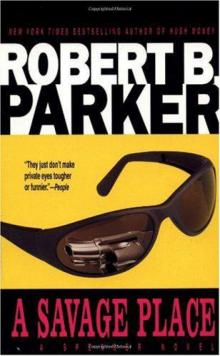 A Savage Place s-8
A Savage Place s-8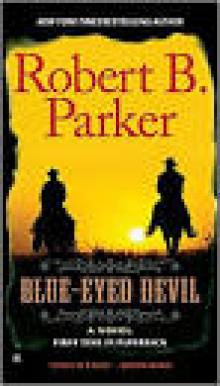 Appaloosa / Resolution / Brimstone / Blue-Eyed Devil
Appaloosa / Resolution / Brimstone / Blue-Eyed Devil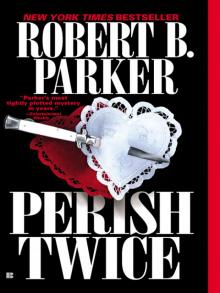 Perish Twice
Perish Twice Spare Change
Spare Change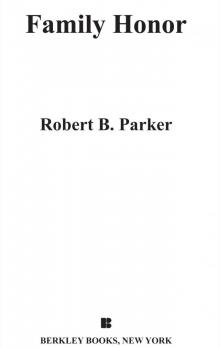 Family Honor
Family Honor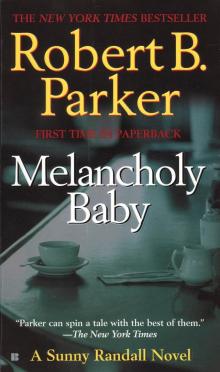 Melancholy Baby
Melancholy Baby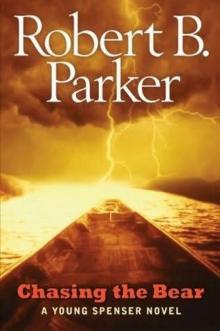 Chasing the Bear
Chasing the Bear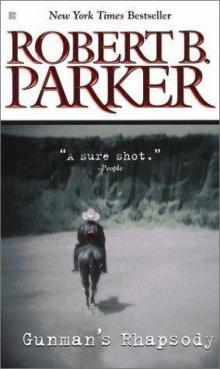 Gunman's Rhapsody
Gunman's Rhapsody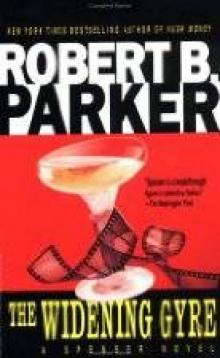 The Widening Gyre
The Widening Gyre Thin Air
Thin Air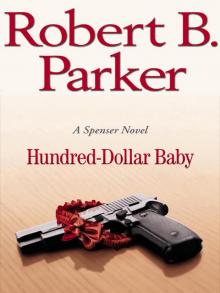 Hundred-Dollar Baby
Hundred-Dollar Baby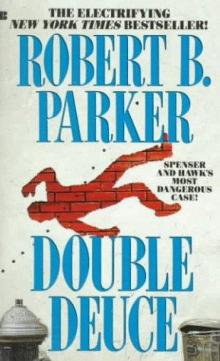 Double Deuce s-19
Double Deuce s-19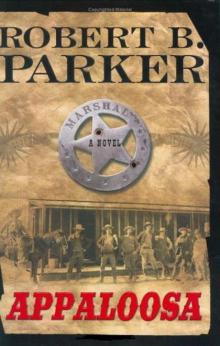 Appaloosa vcaeh-1
Appaloosa vcaeh-1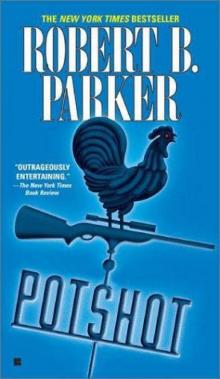 Potshot
Potshot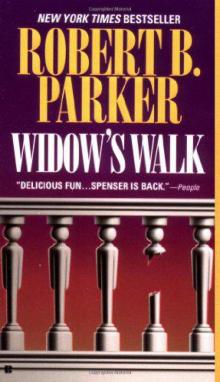 Widow’s Walk s-29
Widow’s Walk s-29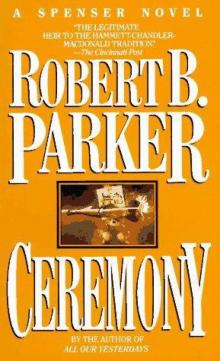 Ceremony s-9
Ceremony s-9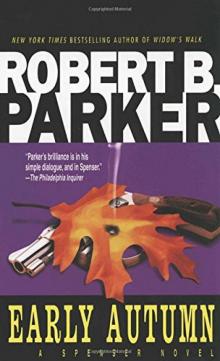 Early Autumn
Early Autumn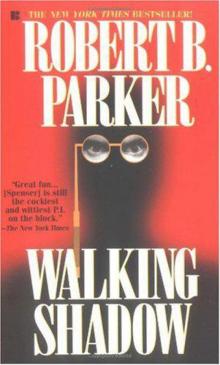 Walking Shadow s-21
Walking Shadow s-21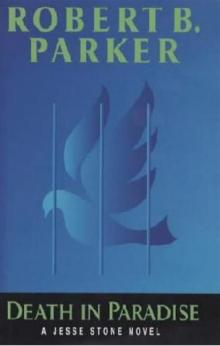 Death In Paradise js-3
Death In Paradise js-3 Shrink Rap
Shrink Rap Blue-Eyed Devil
Blue-Eyed Devil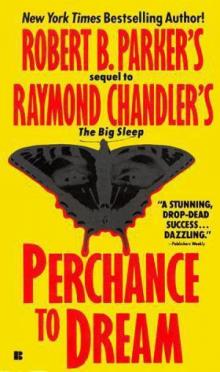 Perchance to Dream
Perchance to Dream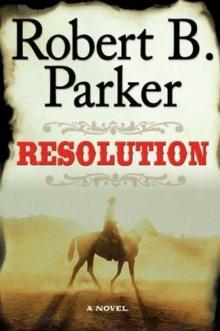 Resolution vcaeh-2
Resolution vcaeh-2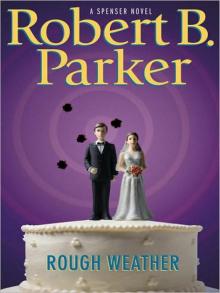 Rough Weather
Rough Weather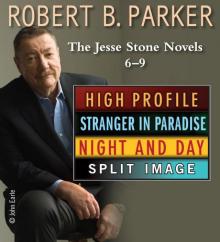 The Jesse Stone Novels 6-9
The Jesse Stone Novels 6-9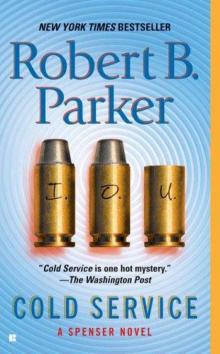 Cold Service s-32
Cold Service s-32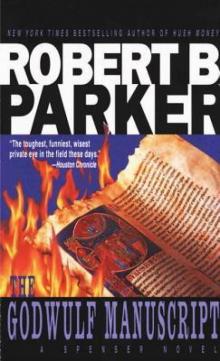 The Godwulf Manuscript
The Godwulf Manuscript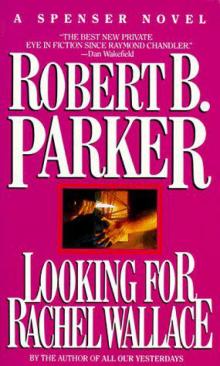 Looking for Rachel Wallace s-6
Looking for Rachel Wallace s-6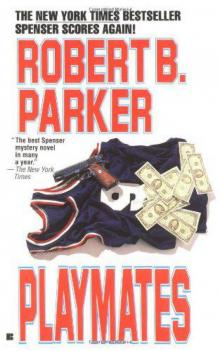 Playmates s-16
Playmates s-16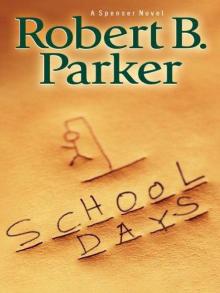 School Days s-33
School Days s-33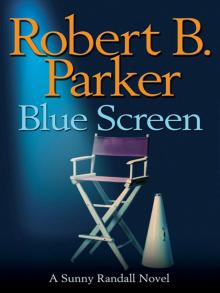 Blue Screen
Blue Screen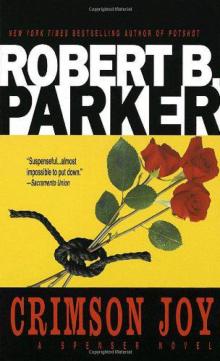 Crimson Joy
Crimson Joy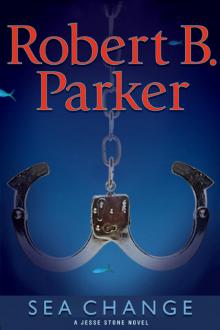 Sea Change js-5
Sea Change js-5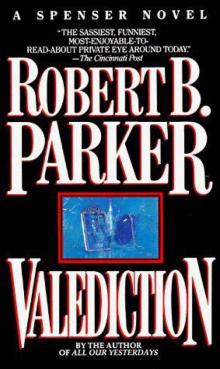 Valediction s-11
Valediction s-11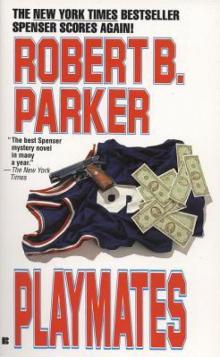 Playmates
Playmates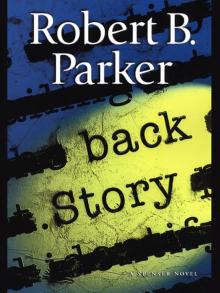 Back Story
Back Story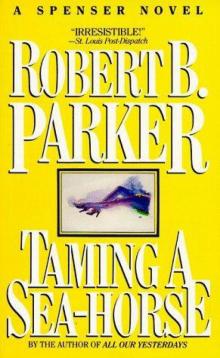 Taming a Sea Horse
Taming a Sea Horse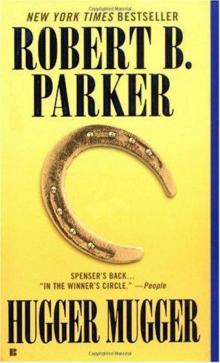 Hugger Mugger
Hugger Mugger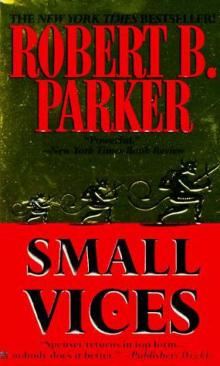 Small Vices s-24
Small Vices s-24 Silent Night: A Spenser Holiday Novel
Silent Night: A Spenser Holiday Novel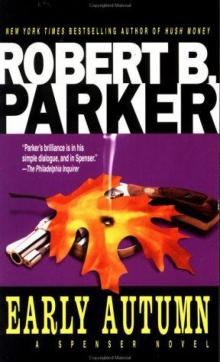 Early Autumn s-7
Early Autumn s-7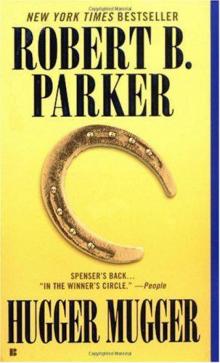 Hugger Mugger s-27
Hugger Mugger s-27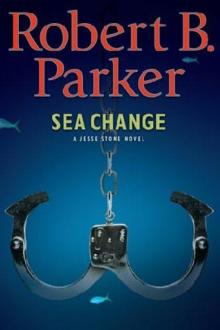 (5/10) Sea Change
(5/10) Sea Change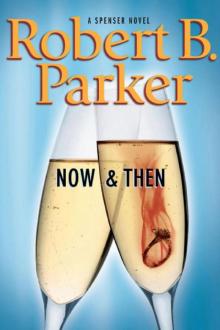 Now and Then
Now and Then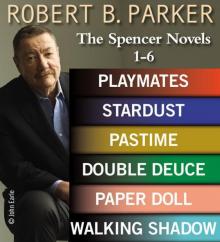 Robert B. Parker: The Spencer Novels 1?6
Robert B. Parker: The Spencer Novels 1?6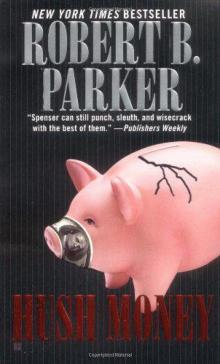 Hush Money s-26
Hush Money s-26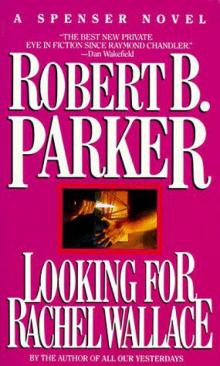 Looking for Rachel Wallace
Looking for Rachel Wallace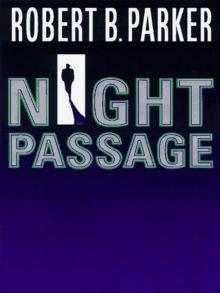 Night Passage
Night Passage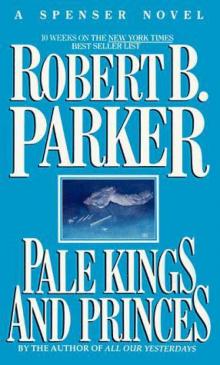 Pale Kings and Princes
Pale Kings and Princes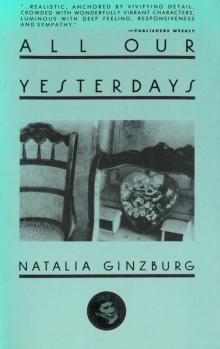 All Our Yesterdays
All Our Yesterdays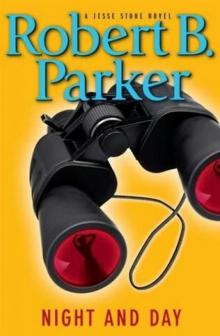 Night and Day js-8
Night and Day js-8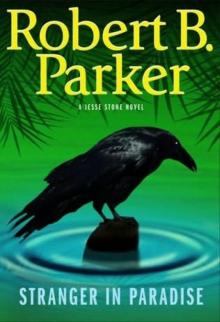 Stranger in Paradise js-7
Stranger in Paradise js-7 Double Play
Double Play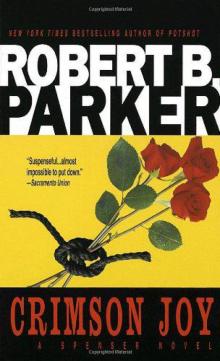 Crimson Joy s-15
Crimson Joy s-15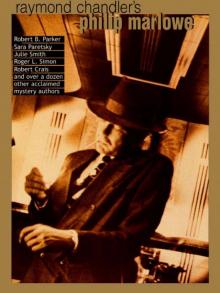 Raymond Chandler's Philip Marlowe
Raymond Chandler's Philip Marlowe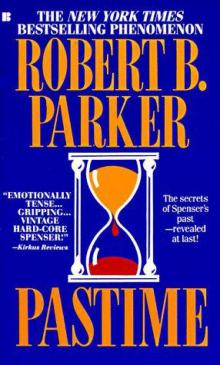 Pastime
Pastime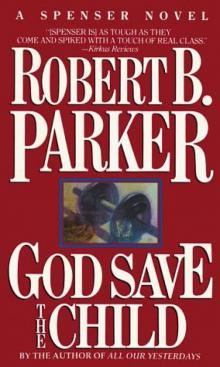 God Save the Child s-2
God Save the Child s-2 Bad Business
Bad Business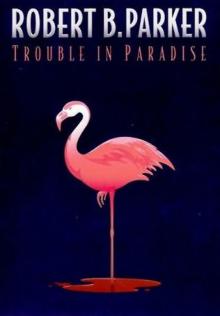 Trouble in Paradise js-2
Trouble in Paradise js-2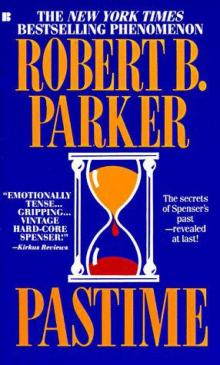 Pastime s-18
Pastime s-18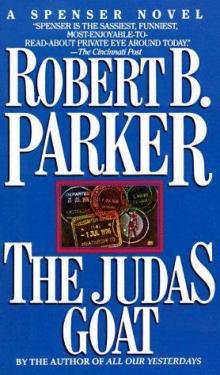 The Judas Goat s-5
The Judas Goat s-5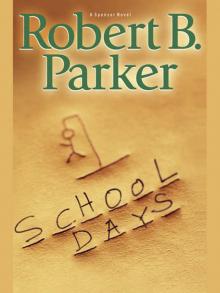 School Days
School Days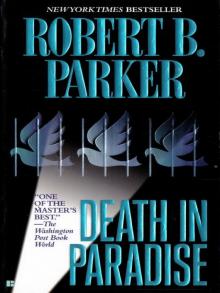 Death In Paradise
Death In Paradise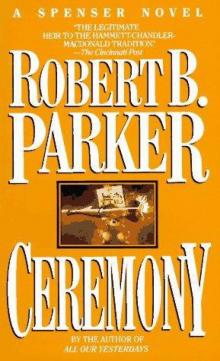 Ceremony
Ceremony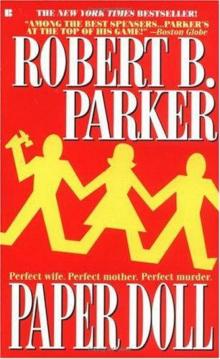 Paper Doll s-20
Paper Doll s-20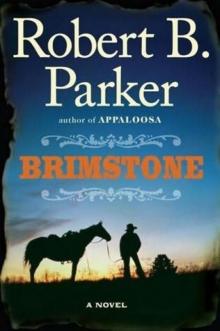 Brimstone vcaeh-3
Brimstone vcaeh-3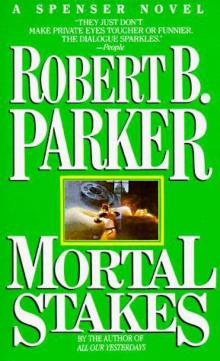 Mortal Stakes s-3
Mortal Stakes s-3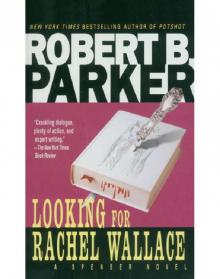 Spencer 06 - Looking for Rachel Wallace
Spencer 06 - Looking for Rachel Wallace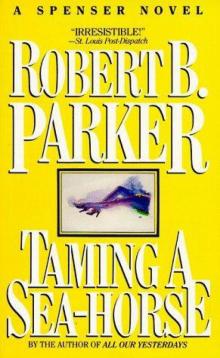 Taming a Sea Horse s-13
Taming a Sea Horse s-13 God Save the Child
God Save the Child Chance
Chance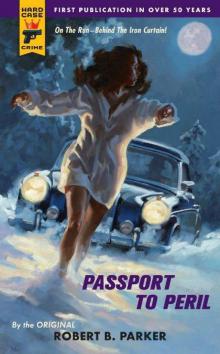 Passport To Peril hcc-57
Passport To Peril hcc-57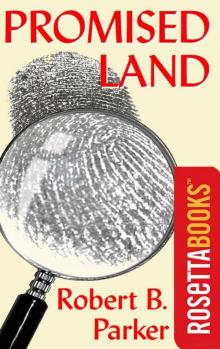 Promised Land
Promised Land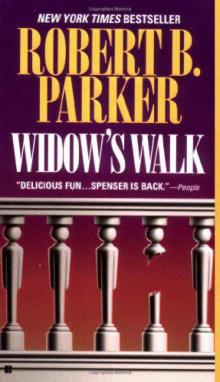 Widow’s Walk
Widow’s Walk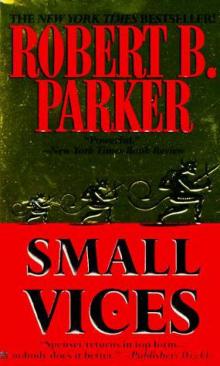 Small Vices
Small Vices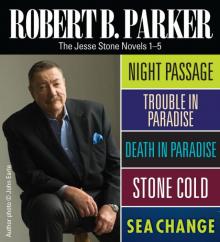 Robert B Parker: The Jesse Stone Novels 1-5
Robert B Parker: The Jesse Stone Novels 1-5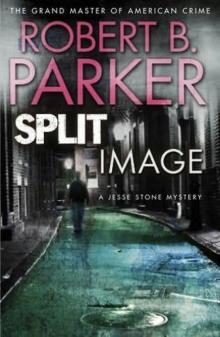 Split Image js-9
Split Image js-9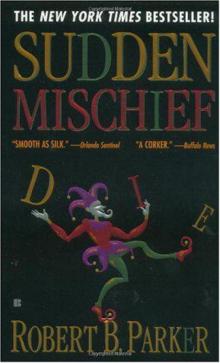 Sudden Mischief s-25
Sudden Mischief s-25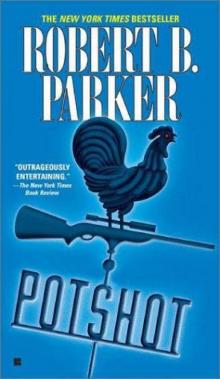 Potshot s-28
Potshot s-28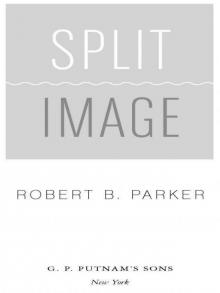 Split Image
Split Image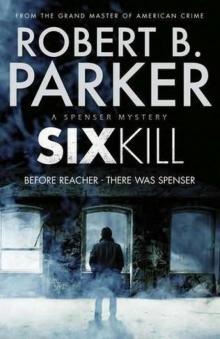 Sixkill s-40
Sixkill s-40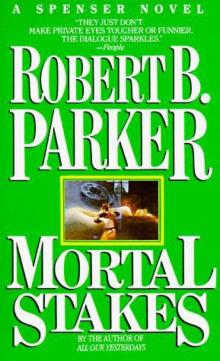 Mortal Stakes
Mortal Stakes Stardust
Stardust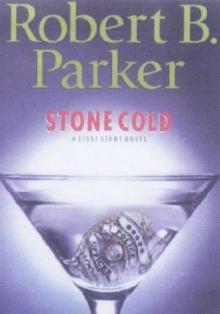 Stone Cold js-4
Stone Cold js-4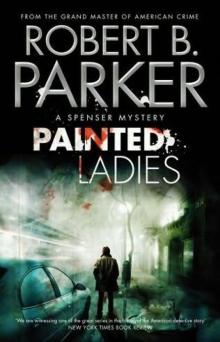 Painted Ladies s-39
Painted Ladies s-39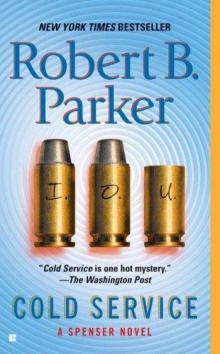 Cold Service
Cold Service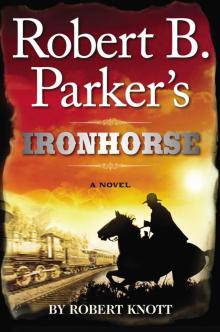 Ironhorse
Ironhorse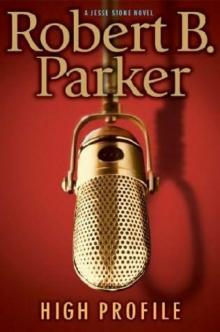 High Profile js-6
High Profile js-6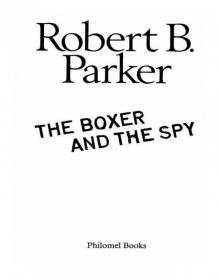 The Boxer and the Spy
The Boxer and the Spy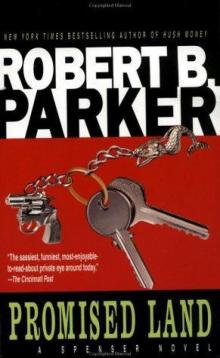 Promised Land s-4
Promised Land s-4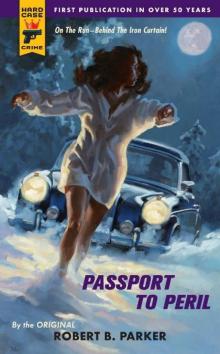 Passport to Peril (Hard Case Crime (Mass Market Paperback))
Passport to Peril (Hard Case Crime (Mass Market Paperback))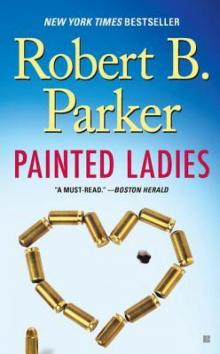 Painted Ladies
Painted Ladies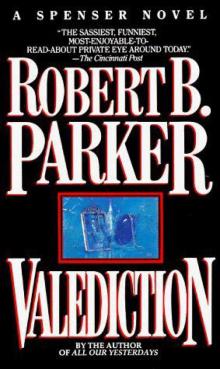 Valediction
Valediction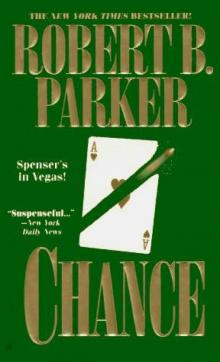 Chance s-23
Chance s-23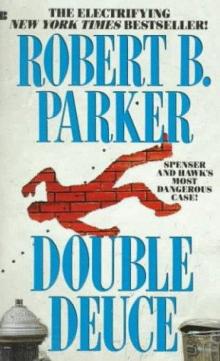 Double Deuce
Double Deuce Wilderness
Wilderness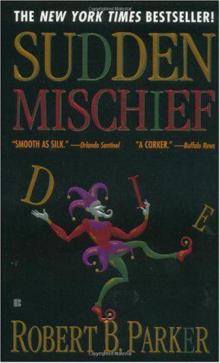 Sudden Mischief
Sudden Mischief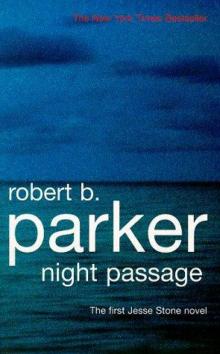 Night Passage js-1
Night Passage js-1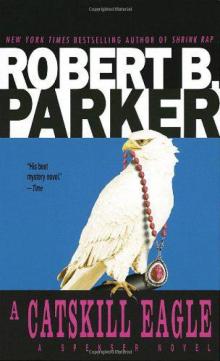 A Catskill Eagle
A Catskill Eagle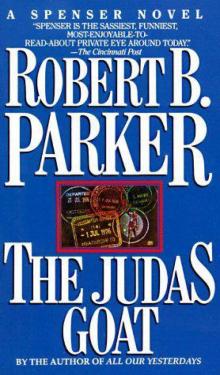 The Judas Goat
The Judas Goat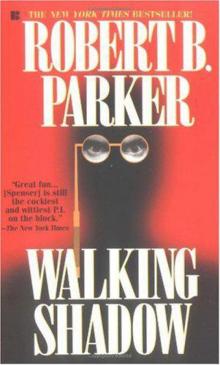 Walking Shadow
Walking Shadow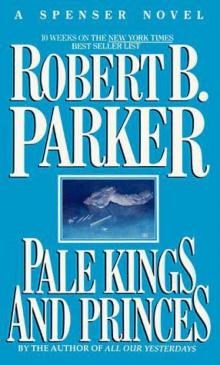 Pale Kings and Princes s-14
Pale Kings and Princes s-14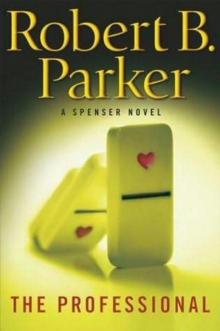 The Professional
The Professional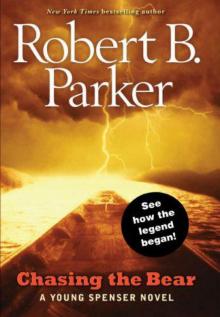 Chasing the Bear s-37
Chasing the Bear s-37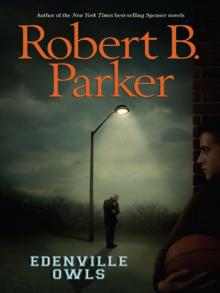 Edenville Owls
Edenville Owls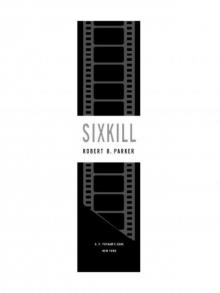 Sixkill
Sixkill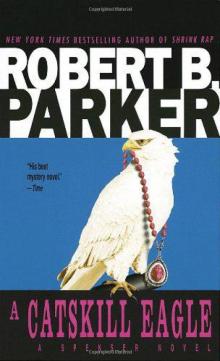 A Catskill Eagle s-12
A Catskill Eagle s-12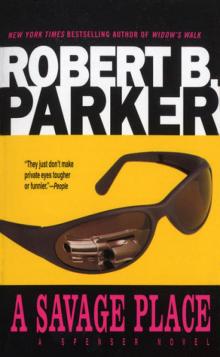 A Savage Place
A Savage Place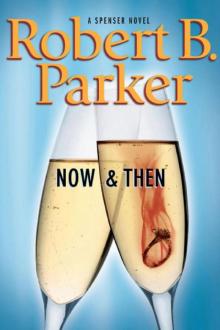 Now and Then s-35
Now and Then s-35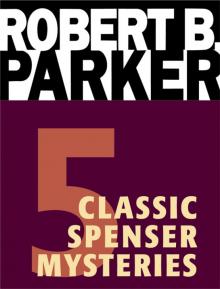 Five Classic Spenser Mysteries
Five Classic Spenser Mysteries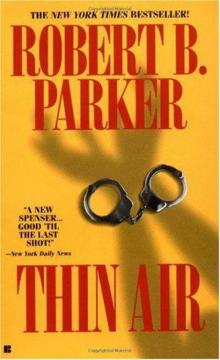 Thin Air s-22
Thin Air s-22